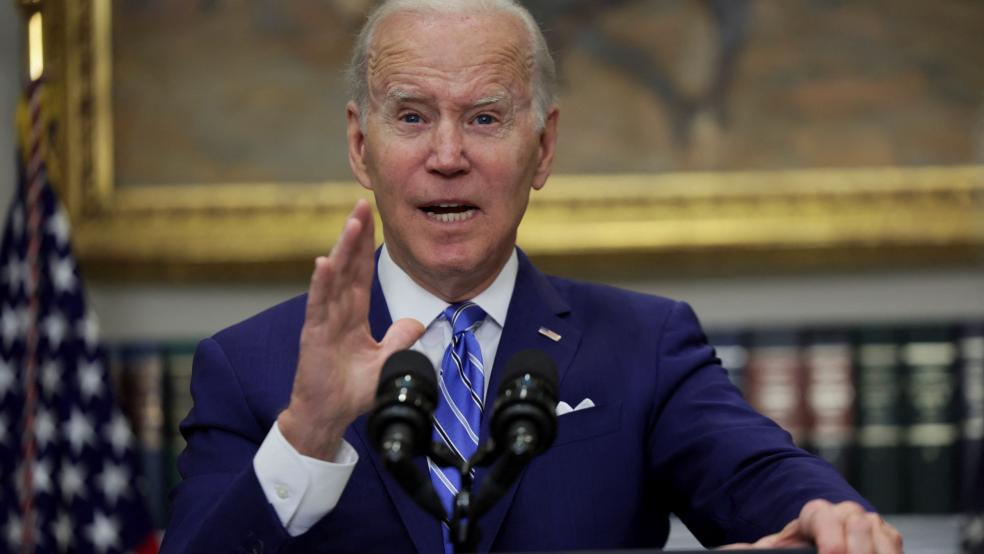President Joe Biden on Wednesday touted new projections showing that the federal budget deficit is on track to fall by $1.5 trillion this year, the largest year-over-year drop ever, and that the Treasury Department expects to be able to pay down the national debt this quarter for the first time in six years.
Ahead of November’s midterm elections, Biden has increasingly emphasized deficit reduction as a key step in fighting inflation that has reached a four-decade high and emerged as a top issue for voters, with 94% of respondents in a recent Washington Post-ABC News poll saying they are concerned or upset about rising prices.
“Bringing down the deficit is one way to ease inflationary pressures in an economy where a consequence of a war and gas prices and oil, food and it all — it’s just a different world right this moment because of Ukraine and Russia,” Biden said Wednesday. “We reduce federal borrowing and we help combat inflation.”
The budget deficit fell by more than $350 billion in Biden’s first year in office and updated estimates from the Treasury Department project that it will drop by more than $1.5 trillion this year, some $200 billion more than previously projected. That decrease would likely leave the annual budget gap below $1.3 trillion, a level that remains historically high.
Drawing an election-year contrast with Republicans: The focus on the deficit and inflation come as Biden seeks to defend and promote his economic policies and score campaign points by contrasting his administration’s fiscal approach with that of former President Donald Trump and a proposal from Republican Sen. Rick Scott of Florida.
Biden last month criticized the Trump administration for “fiscal mismanagement” and argued that the current administration is “reducing the Trump deficits and returning our fiscal house to order.” The president and other administration officials argue that Democrats’ $1.9 trillion American Rescue Plan Act passed in 2021 helped fuel a stronger-than-expected recovery from the coronavirus pandemic and, as a result, boosted federal tax revenues and brought down the deficit.
“For all the talk that Republicans make about deficits, it didn’t happen a single quarter under my predecessor. Not once,” Biden said of paying down the debt. “The bottom line is the deficit went up every year under my predecessor, before the pandemic and during the pandemic. And it’s gone down both years since I’ve been here, period. They’re the facts.”
Biden on Wednesday also hammered a controversial plan released earlier this by Scott, which called for all Americans to pay some federal income tax. Democrats have honed in on the plan as a line of attack on the GOP. “Let me tell you about this Ultra-MAGA Agenda,” Biden said Wednesday. “It’s extreme, as most MAGA things are. It will actually raise taxes on 75 million American families, over 95 percent of whom make less than $100,000 a year. … And under this new plan, this tax plan — the Ultra-MAGA Agenda — while big corporations and billionaires are going to pay nothing more, the working-class folks are going to pay a hell of a lot more.”
Wooing Joe Manchin: Biden’s emphasis on the deficit and inflation also dovetails with the priorities laid out by Sen. Joe Manchin (D-WV), a key vote in an evenly divided Senate as Democrats still hope to pass a legislative package of climate programs and tax changes. Biden said Wednesday that he plans to reduce the deficit more and touted elements of his economic agenda that he said would help lower costs for families. Democrats’ ability to enact that agenda, or portions of it, depends to a large extent on Manchin.
How will deficit reduction play politically? “It is unclear if greater fiscal responsibility can deliver politically for Biden as Democrats try to defend control of Congress,” Josh Boak and Fatima Hussein of the Associated Press write. “One of the challenges for Biden is that voters have largely shrugged off deficit increases and seldom rewarded deficit cuts. Voters might discuss the idea of reducing deficits with pollsters, yet health care, incomes and inflation are often top of mind when casting their ballots.”
Norman Ornstein, a senior fellow emeritus at the conservative American Enterprise Institute, told the AP that voters are more likely to be moved by issues that they see as having a direct effect on their lives. Deficits, he said, are “a step removed for most voters, and we’ve been through periods where we’ve had the big deficits and debt and it’s not like it devastated directly people’s lives.”
Budget hawks say more needs to be done: Budget watchers applauded the president’s focus on the deficit but questioned how much credit he can claim for reducing the deficit, noting that the drop is largely the result of the expiration of pandemic stimulus spending and higher inflation. “It is wonderful to have a president in the White House who acknowledges the importance of fiscal responsibility; now we need more policy choices to back that up,” said Maya MacGuineas, president of the Committee for a Responsible Federal Budget. And Douglas Holtz-Eakin, a former director of the Congressional Budget Office who now leads the right-leaning American Action Forum, told the AP: “There needs to be a real fiscal restructuring because we continue to see these trillion-dollar deficits as far as the eye can see.”





